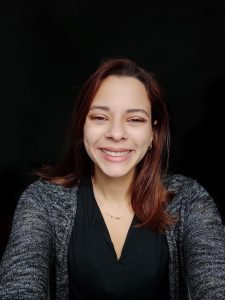 Dr. Mayra Rodríguez joined UConn Extension in August 2022 as our Urban Community Forestry educator. We sat down for a Q&A with her about her Extension program and interests.
Dr. Mayra Rodríguez joined UConn Extension in August 2022 as our Urban Community Forestry educator. We sat down for a Q&A with her about her Extension program and interests.
How did you get interested and involved in forestry?
I’ve been told that my path to forestry is a bit unconventional, but I think this just proves that we all can experience the field in different ways. I grew up in the San Juan metropolitan region of Puerto Rico. Although I had little interactions with local natural spaces, I used to love seeing what my grandmother would grow in the backyard of her small city house. She would often tell me what each vegetable and herb could be used for, from cooking to medicinal home remedies.
Once in university, I joined our ESA SEEDS chapter and was in charge of maintaining our urban community garden as well as holding numerous public workshops. In the meantime I did several internships where I learned about natural resource management as well as work with a local community-led nonprofit organization to promote conservation in urban areas. After graduating with my Bachelor’s in Biology, I enrolled in a PhD program in Forestry and Natural Resources at Purdue University. From there, onwards, I’ve supported local groups, agencies and organizations in grounding natural resource planning in equity.
Tell us about your course work and career before coming to UConn?
I have a Bachelor’s degree in Biology and a PhD in Forestry and Natural Resources. I did my undergrad at the University of Puerto Rico in Bayamón and my graduate degree at Purdue University. During undergrad, most of my coursework was unrelated to my current field of work but I did take courses in Ecology and Plant Biology. As graduate students, we were expected to take a course in Extension. This was my first formal introduction to the Cooperative Extension System in general.
Prior to working with Extension at UConn, I was a postdoctoral researcher at the University of Vermont. There, I supported the Spatial Analysis Laboratory and their tree canopy assessments, working with many city agencies throughout the United States.
What is the most challenging part about your field?
Forestry is a male and white dominated field. So far, the most challenging part has been dealing with what means to be a Hispanic woman in forestry.
Because of the nature of my work (which centers on environmental justice and working closely with underserved communities), it can also be challenging to convey the importance of equity in planning, management and decision making. Sometimes, our privilege blinds us from how others experience the world.
And the most rewarding?
The most rewarding part of my work is seeing positive change take place as its related to inclusive and equity-based practices in urban forestry.
What are your goals for your new position with Extension?
The goal of my extension programs is to create an inclusive atmosphere where we can ensure that deliverables from forestry and environmental efforts are in alignment with the priorities of communities who have been historically excluded from planning, research, and extension.
What will success look like for Extension?
Extension has many wonderful programs. I think I will call myself successful if I can bridge the gap that exist in our efforts in reaching underserved or historically marginalized populations.
How can we all (residents in Connecticut) make a positive impact on environmental justice?
At an individual level, by being conscious of how our decisions towards the environment (as basic as they may be) not only impact us but others as well. In our communities, we can support local groups, organizations and/or initiatives that strive to dismantle structures of racism and discrimination impacting the fair and equitable access to nature and its benefits for all.
What is one thing you want everyone to know about forestry/the environment?
That we all deserve quality of life, which means we all deserve access to clean air and water, healthy forests, ecosystem services, etc. However, this is also tied to having other needs met such as housing, food, and employment. Pursuing environmental goals do not have to occur in exclusion of providing access to these basic goods.